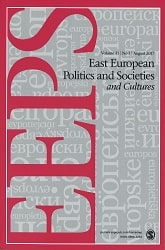The Italian Role in the Construction of the Concept “Pole-Catholic”
The Italian Role in the Construction of the Concept “Pole-Catholic”
Author(s): Lidia JurekSubject(s): Christian Theology and Religion, Political history, Recent History (1900 till today), International relations/trade, Politics and religion, 19th Century, Politics and Identity
Published by: SAGE Publications Ltd
Keywords: national identity; religion; Poland; cultural transfer;
Summary/Abstract: In considering the concept of “Pole-Catholic,” it might well be asked not if it had real grounds but in what circumstances it was constructed. Although the Polish national identity in its current shape was “Catholicized” mostly in the twentieth century, the previous age—the nineteenth century—as a time of constant struggle for political independence has been regarded as having the most formative effect on Polish national imagination. This article discusses an important moment in the construction of the concept “Pole-Catholic.” It shows that far before the idea of Roman Dmowski (from the turn of the nineteenth and twentieth centuries), who claimed that only a Catholic was a good Pole, the strong identification of Polish nationalism with Catholicism had been insistently articulated by Polish conservative groups. The discourse of the Catholic Polish nation appeared in (and even dominated) the debate on the Italian Risorgimento. Between 1848 and 1871, discussing the Italian–papal conflict, the conservatives created their religious programme for Poland and took advantage of the popularity of the Italian national movement among Poles to promote it in their writings. Their equation of Polishness with Catholicism appeared to leave a strong trace in the formation of the Polish identity and continues to inform the way in which Poles are perceived nowadays.
Journal: East European Politics and Societies
- Issue Year: 24/2010
- Issue No: 02
- Page Range: 254-268
- Page Count: 15
- Language: English
- Content File-PDF

